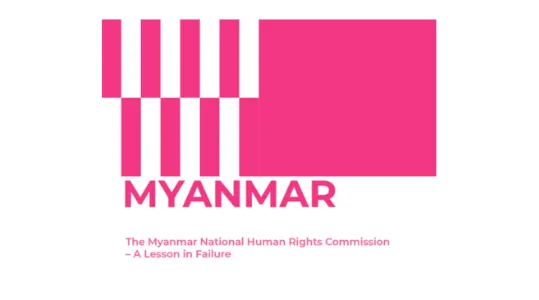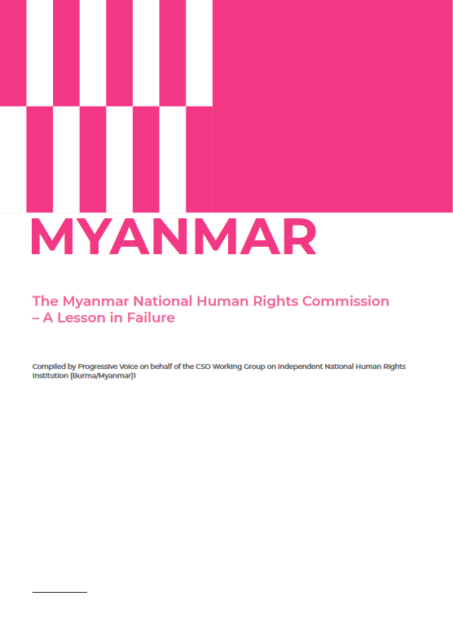The Myanmar National Human Rights Commission – A Lesson in Failure
28 November 2023

Introduction
The Myanmar National Human Rights Commission (MNHRC) was formed in 2011 and mandated by its enabling law, the Myanmar National Human Rights Commission Law, in 2014. It was graded as a status ‘B’ national human rights institution (NHRI) in November 2015 by the Global Alliance of National Human Rights Institutions’ Sub-Committee on Accreditation (GANHRI-SCA). This status indicates the MNHRC’s failure to fully comply with the Paris Principles. The GANHRI-SCA listed seven problematic aspects of the Commission because of which it got this grading: a) selection and appointment; b) performance in situations of civil unrest or armed conflict; c) pluralism; d) adequate funding and financial independence; e) monitoring places of deprivation of liberty; f) interaction with the international human rights system; and g) annual report.
Since the 2015 accreditation process there have been several emblematic cases that demonstrate the MNHRC’s lack of independence, effectiveness, and pluralism.
One example is the 2016 Ava Tailoring case, in which a prominent tailoring family business in downtown Yangon was found to have abused and tortured two teenage maids and forced them to work with little or no pay. After the case came to light and was reported to the MNHRC, rather than pursuing legal action or setting accountability, the MNHRC pressured the families of the two victims to accept money from the tailoring family.
Moreover, in conflict-affected parts of Myanmar, the MNHRC has proven to be particularly ineffective. This can be seen in its consistent adherence to the military’s narrative during the investigations into civilian deaths in Kachin State in 2018 and Rakhine State in 2019, as well as its complete silence over the Rohingya genocide in 2017. It is also important to note that, between 2016 and 2018, there were no women commissioners in the MNHRC.
The MNHRC has utterly failed to address the magnifying human rights crisis in Myanmar after the military’s attempted coup on 1 February 2021. The military junta has torn up the previous tenuous
agreement between the civilian government of the National League for Democracy and the Myanmar military by attempting to subvert the democratic will of the people of Myanmar, as expressed in the 2020 national elections.
The junta has been waging an all-out assault against the people of Myanmar, and the country is now in a state of full-blown nationwide war. The illegal junta has also enacted or amended several
laws that further suppress and violate the fundamental human rights of the people of Myanmar.
This includes legalising military interception of electronic communications, expanding Section 505(A) of the Penal Code to criminalise the expression of dissent such as protesting, and amending the Electronic Transactions Law to criminalise online criticism of the military junta.
The military junta faces fierce resistance, both civil and armed, from the nationwide Civil Disobedience Movement, the emergence of People’s Defence Forces, and the long-standing Ethnic Resistance Organisations. Long-established ethnic governance entities and structures, service providers, and newly established people’s administration bodies govern significant parts of the country. The National Unity Government (NUG) is the government formed of elected Members of Parliament from the 2020 elections and ethnic and civil society leaders. The NUG is the overarching government that the people of Myanmar view as their legitimate governing institution.
The military junta has responded to the resistance with disproportionate levels of violence, including targeted killings of civilians, massacres, airstrikes, arbitrary arrests, extra-judicial killings, sexual and gender-based violence, and relentless persecution of political figures and human rights defenders. As of 22 September 2023, the junta has killed over 4,100 people (including 457 children); arbitrarily arrested nearly 25,000 civilians (about 20,000 of whom remain in detention), and sentenced around 150 dissenters to death. The junta continues to commit war crimes against civilians (including children) and crimes against humanity at will, often targeting places of worship, schools, and hospitals.
One of the worst massacres occurred in April 2023, where an aerial bombing, followed by helicopter attacks, killed at least 170 people in Pa Zi Gyi Village in Sagaing Region as they gathered to celebrate the opening of a new administration department. The Special Rapporteur on the situation of human rights in Myanmar, Tom Andrews, repeated his determination to the UN Human Rights Council in June 2022 that the junta’s daily attacks amount to war crimes and crimes against humanity.
Announcements
21 May 2025
Open letter: Malaysia must lead ASEAN with principle, not hypocrisy, to address the Myanmar crisis

Progressive Voice is a participatory rights-based policy research and advocacy organization rooted in civil society, that maintains strong networks and relationships with grassroots organizations and community-based organizations throughout Myanmar. It acts as a bridge to the international community and international policymakers by amplifying voices from the ground, and advocating for a rights-based policy narrative.
